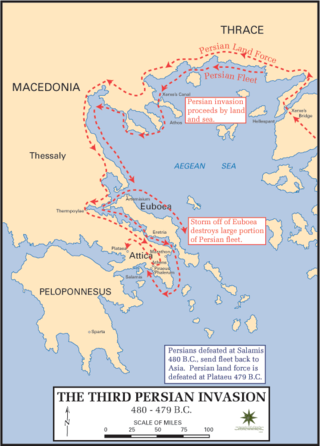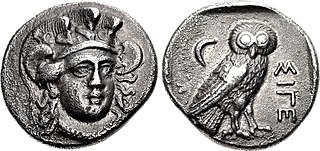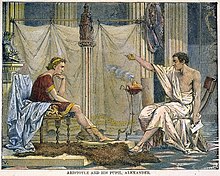
Year 323 BC was a year of the pre-Julian Roman calendar. At the time, it was known as the Year of the Consulship of Longus and Cerretanus. The denomination 323 BC for this year has been used since the early medieval period, when the Anno Domini calendar era became the prevalent method in Europe for naming years.
This article concerns the period 349 BC – 340 BC.

Template:Reimprove
This article concerns the period 369 BC – 360 BC
This article concerns the period 359 BC – 350 BC.
This article concerns the period 339 BC – 330 BC.

This article concerns the period 329 BC – 320 BC.
This article concerns the period 319 BC – 310 BC.
During the 290s BC, Hellenistic civilization begins its emergence throughout the successor states of the former Argead Macedonian Empire of Alexander the Great, resulting in the diffusion of Greek culture throughout the Levant and advances in science, mathematics, philosophy, etc. Meanwhile, the Roman Republic is embroiled in war against the Samnites, the Mauryan Empire continues to thrive in Ancient India, and the Kingdom of Qin in Ancient China, the one which in the future will conquer its adversaries and unite China, begins to emerge as a significant power during the Warring States period.
Year 316 BC was a year of the pre-Julian Roman calendar. At the time, it was known as the Year of the Consulship of Rutilus and Laenas. The denomination 316 BC for this year has been used since the early medieval period, when the Anno Domini calendar era became the prevalent method in Europe for naming years.
Year 357 BC was a year of the pre-Julian Roman calendar. At the time, it was known as the Year of the Consulship of Rutilus and Imperiosus. The denomination 357 BC for this year has been used since the early medieval period, when the Anno Domini calendar era became the prevalent method in Europe for naming years.
Year 364 BC was a year of the pre-Julian Roman calendar. At the time, it was known as the Year of the Consulship of Peticus and Calvus. The denomination 364 BC for this year has been used since the early medieval period, when the Anno Domini calendar era became the prevalent method in Europe for naming years.

Antipater was a Macedonian general and statesman under the successive kingships of Philip II of Macedon and his son, Alexander the Great. In the wake of the collapse of the Argead house, his son Cassander would eventually come to rule Macedonia as a king in his own right.
Cardia or Kardia, anciently the chief town of the Thracian Chersonese, was situated at the head of the Gulf of Melas. It was originally a colony of the Milesians and Clazomenians; but subsequently, in the time of Miltiades, the place also received Athenian colonists, as proved by Miltiades tyranny. But this didn't make Cardia necessarily always pro-Athenian: when in 357 BC Athens took control of the Chersonese, the latter, under the rule of a Thracian prince, was the only city to remain neutral; but the decisive year was 352 BC when the city concluded a treaty of amity with king Philip II of Macedonia. A great crisis exploded when Diopeithes, an Athenian mercenary captain, had in 343 BC brought Attic settlers to the town; and since Cardia was unwilling to receive them, Philip immediately sent help to the town. The king proposed to settle the dispute between the two cities by arbitration, but Athens refused. Demosthenes, the famous Greek patriot and orator, spoke on this very matter to the Athenian Senate in 341 BC his "Oration On The State Of The Chersonesus":
Our present concernment is about the affairs of the Chersonesus, and Philip's expedition into Thrace...but most of our orators insist upon the actions and designs of Diopithes...which, if one moment neglected, the loss may be irreparable; here our attention is instantly demanded...shall Philip be left at full liberty to pursue all his other designs, provided he keeps from Attica; and shall not Diopithes be permitted to assist the Thracians? And if he does, shall we accuse him of involving us in a war?...none of you can be weak enough to imagine that Philip's desires are centered in those paltry villages of Thrace...and has no designs on the ports...arsenals...navies...silver mines, and all the other revenues of Athens; but that he will leave them for you to enjoy...? Impossible! No; these and all his expeditions are really intended to facilitate the conquest of Athens....let us shake off our extravagant and dangerous supineness; let us supply the necessary expenses; let us call on our allies...so that, as he hath his force constantly prepared to injure and enslave the Greeks, yours too may be ever ready to protect and assist them.
Diopeithes was an Athenian general, probably father of the poet Menander, who was sent out to the Thracian Chersonese about 343 BC, at the head of a body of Athenian settlers or cleruchs.
Cersobleptes, was son of Cotys I, king of the Odrysians in Thrace, on whose death in September 360 BC he inherited the throne.

Chares of Athens was a 4th-century BC Athenian military commander (Strategos), who for a number of years was one of Athens's foremost commanders. He was also a well connected politician enabling him to procure the commands he desired, commands he primarily used to enrich himself and his adherents.
The "Third Philippic" was delivered by the prominent Athenian statesman and orator, Demosthenes, in 341 BC. It constitutes the third of the four philippics.
"On the Chersonese" is a political oration delivered by the Athenian statesman and orator Demosthenes in 341 BC. A short time later Demosthenes delivered one of his most famous speeches, the Third Philippic.

Under the reign of Philip II, the ancient kingdom of Macedonia, initially at the periphery of classical Greek affairs, came to dominate Ancient Greece in the span of just 25 years, largely thanks to the character and policies of its king. In addition to utilising effective diplomacy and marriage alliances to achieve his political aims, Philip II was responsible for reforming the ancient Macedonian army into an effective fighting force. The Macedonian phalanx became the hallmark of the Macedonian army during his reign and the subsequent Hellenistic period. His army and engineers also made extensive use of siege engines. Chief among Philip's Thracian enemies was the ruler Kersebleptes, who may have coordinated a temporary alliance with Athens. In a series of campaigns stretching from 356 to 340 BC, Philip II managed to ultimately subjugate Kersebleptes as a tributary vassal, conquering much of Thrace in the process. Philip II also fought against the Illyrian king Bardylis, who threatened Macedonia proper, and against Grabos II and Pleuratus in Illyria. In his newly conquered territories, he founded new cities such as Philippi, Philippopolis, Herakleia Sintike, and Herakleia Lynkestis.





